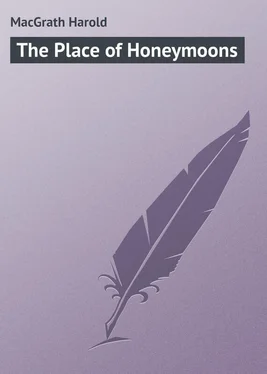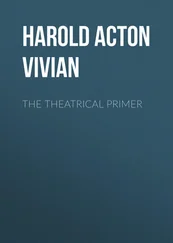Harold MacGrath - The Place of Honeymoons
Здесь есть возможность читать онлайн «Harold MacGrath - The Place of Honeymoons» — ознакомительный отрывок электронной книги совершенно бесплатно, а после прочтения отрывка купить полную версию. В некоторых случаях можно слушать аудио, скачать через торрент в формате fb2 и присутствует краткое содержание. Жанр: foreign_language, foreign_prose, на английском языке. Описание произведения, (предисловие) а так же отзывы посетителей доступны на портале библиотеки ЛибКат.
- Название:The Place of Honeymoons
- Автор:
- Жанр:
- Год:неизвестен
- ISBN:нет данных
- Рейтинг книги:5 / 5. Голосов: 1
-
Избранное:Добавить в избранное
- Отзывы:
-
Ваша оценка:
- 100
- 1
- 2
- 3
- 4
- 5
The Place of Honeymoons: краткое содержание, описание и аннотация
Предлагаем к чтению аннотацию, описание, краткое содержание или предисловие (зависит от того, что написал сам автор книги «The Place of Honeymoons»). Если вы не нашли необходимую информацию о книге — напишите в комментариях, мы постараемся отыскать её.
The Place of Honeymoons — читать онлайн ознакомительный отрывок
Ниже представлен текст книги, разбитый по страницам. Система сохранения места последней прочитанной страницы, позволяет с удобством читать онлайн бесплатно книгу «The Place of Honeymoons», без необходимости каждый раз заново искать на чём Вы остановились. Поставьте закладку, и сможете в любой момент перейти на страницу, на которой закончили чтение.
Интервал:
Закладка:
Harold MacGrath
The Place of Honeymoons
Horace calls no more to me,
Homer in the dust-heap lies:
I have found my Odyssey
In the lightness of her glee,
In the laughter of her eyes.
Ovid’s page is thumbed no more,
E’en Catullus has no choice!
There is endless, precious lore,
Such as I ne’er knew before,
In the music of her voice.
Breath of hyssop steeped in wine,
Breath of violets and furze,
Wild-wood roses, Grecian myrrhs,
All these perfumes do combine
In that maiden breath of hers.
Nay, I look not at the skies,
Nor the sun that hillward slips,
For the day lives or it dies
In the laughter of her eyes,
In the music of her lips!
CHAPTER I
AT THE STAGE DOOR
Courtlandt sat perfectly straight; his ample shoulders did not touch the back of his chair; and his arms were folded tightly across his chest. The characteristic of his attitude was tenseness. The nostrils were well defined, as in one who sets the upper jaw hard upon the nether. His brown eyes – their gaze directed toward the stage whence came the voice of the prima donna – epitomized the tension, expressed the whole as in a word.
Just now the voice was pathetically subdued, yet reached every part of the auditorium, kindling the ear with its singularly mellowing sweetness. To Courtlandt it resembled, as no other sound, the note of a muffled Burmese gong, struck in the dim incensed cavern of a temple. A Burmese gong: briefly and magically the stage, the audience, the amazing gleam and scintillation of the Opera, faded. He heard only the voice and saw only the purple shadows in the temple at Rangoon, the oriental sunset splashing the golden dome, the wavering lights of the dripping candles, the dead flowers, the kneeling devoteés, the yellow-robed priests, the tatters of gold-leaf, fresh and old, upon the rows of placid grinning Buddhas. The vision was of short duration. The sigh, which had been so long repressed, escaped; his shoulders sank a little, and the angle of his chin became less resolute; but only for a moment. Tension gave place to an ironical grimness. The brows relaxed, but the lips became firmer. He listened, with this new expression unchanging, to the high note that soared above all others. The French horns blared and the timpani crashed. The curtain sank slowly. The audience rustled, stood up, sought its wraps, and pressed toward the exits and the grand staircase. It was all over.
Courtlandt took his leave in leisure. Here and there he saw familiar faces, but these, after the finding glance, he studiously avoided. He wanted to be alone. For while the music was still echoing in his ears, in a subtone, his brain was afire with keen activity; but unfortunately for the going forward of things, this mental state was divided into so many battalions, led by so many generals, indirectly and indecisively, nowhere. This plan had no beginning, that one had no ending, and the other neither beginning nor ending. Outside he lighted a cigar, not because at that moment he possessed a craving for nicotine, but because like all inveterate smokers he believed that tobacco conduced to clarity of thought. And mayhap it did. At least, there presently followed a mental calm that expelled all this confusion. The goal waxed and waned as he gazed down the great avenue with its precise rows of lamps. Far away he could discern the outline of the brooding Louvre.
There was not the least hope in the world for him to proceed toward his goal this night. He realized this clearly, now that he was face to face with actualities. It required more than the chaotic impulses that had brought him back from the jungles of the Orient. He must reason out a plan that should be like a straight line, the shortest distance between two given points. How then should he pass the night, since none of his schemes could possibly be put into operation? Return to his hotel and smoke himself headachy? Try to become interested in a novel? Go to bed, to turn and roll till dawn? A wild desire seized him to make a night of it, – Maxim’s, the cabarets; riot and wine. Who cared? But the desire burnt itself out between two puffs of his cigar. Ten years ago, perhaps, this particular brand of amusement might have urged him successfully. But not now; he was done with tomfool nights. Indeed, his dissipations had been whimsical rather than banal; and retrospection never aroused a furtive sense of shame.
He was young, but not so young as an idle glance might conjecture in passing. To such casual reckoning he appeared to be in the early twenties; but scrutiny, more or less infallible, noting a line here or an angle there, was disposed to add ten years to the score. There was in the nose and chin a certain decisiveness which in true youth is rarely developed. This characteristic arrives only with manhood, manhood that has been tried and perhaps buffeted and perchance a little disillusioned. To state that one is young does not necessarily imply youth; for youth is something that is truly green and tender, not rounded out, aimless, light-hearted and desultory, charming and inconsequent. If man regrets his youth it is not for the passing of these pleasing, though tangled attributes, but rather because there exists between the two periods of progression a series of irremediable mistakes. And the subject of this brief commentary could look back on many a grievous one brought about by pride or carelessness rather than by intent.
But what was one to do who had both money and leisure linked to an irresistible desire to leave behind one place or thing in pursuit of another, indeterminately? At one time he wanted to be an artist, but his evenly balanced self-criticism had forced him to fling his daubs into the ash-heap. They were good daubs in a way, but were laid on without fire; such work as any respectable schoolmarm might have equaled if not surpassed. Then he had gone in for engineering; but precise and intricate mathematics required patience of a quality not at his command.
The inherent ambition was to make money; but recognizing the absurdity of adding to his income, which even in his extravagance he could not spend, he gave himself over into the hands of grasping railroad and steamship companies, or their agencies, and became for a time the slave of guide and dragoman and carrier. And then the wanderlust, descended to him from the blood of his roving Dutch ancestors, which had lain dormant in the several generations following, sprang into active life again. He became known in every port of call. He became known also in the wildernesses. He had climbed almost inaccessible mountains, in Europe, in Asia; he had fished and hunted north, east, south and west; he had fitted out polar expeditions; he had raided the pearl markets; he had made astonishing gifts to women who had pleased his fancy, but whom he did not know or seek to know; he had kept some of his intimate friends out of bankruptcy; he had given the most extravagant dinners at one season and, unknown, had supported a bread-line at another; he had even financed a musical comedy.
Whatever had for the moment appealed to his fancy, that he had done. That the world – his world – threw up its hands in wonder and despair neither disturbed him nor swerved him in the least. He was alone, absolute master of his millions. Mamas with marriageable daughters declared that he was impossible; the marriageable daughters never had a chance to decide one way or the other; and men called him a fool. He had promoted elephant fights which had stirred the Indian princes out of their melancholy indifference, and tiger hunts which had, by their duration and magnificence, threatened to disrupt the efficiency of the British military service, – whimsical excesses, not understandable by his intimate acquaintances who cynically arraigned him as the fool and his money.
Читать дальшеИнтервал:
Закладка:
Похожие книги на «The Place of Honeymoons»
Представляем Вашему вниманию похожие книги на «The Place of Honeymoons» списком для выбора. Мы отобрали схожую по названию и смыслу литературу в надежде предоставить читателям больше вариантов отыскать новые, интересные, ещё непрочитанные произведения.
Обсуждение, отзывы о книге «The Place of Honeymoons» и просто собственные мнения читателей. Оставьте ваши комментарии, напишите, что Вы думаете о произведении, его смысле или главных героях. Укажите что конкретно понравилось, а что нет, и почему Вы так считаете.












